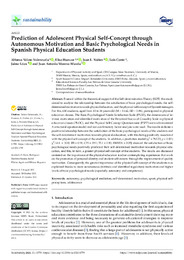Por favor, use este identificador para citar o enlazar este ítem:
https://hdl.handle.net/11000/38434Registro completo de metadatos
| Campo DC | Valor | Lengua/Idioma |
|---|---|---|
| dc.contributor.author | Valero-Valenzuela, Alfonso | - |
| dc.contributor.author | Huéscar Hernández, Elisa | - |
| dc.contributor.author | Núñez, Juan L. | - |
| dc.contributor.author | Conte, Luis | - |
| dc.contributor.author | León, Jaime | - |
| dc.contributor.author | Moreno-Murcia, Juan Antonio | - |
| dc.contributor.other | Departamentos de la UMH::Psicología de la Salud | es_ES |
| dc.date.accessioned | 2025-11-24T12:12:52Z | - |
| dc.date.available | 2025-11-24T12:12:52Z | - |
| dc.date.created | 2021-10 | - |
| dc.identifier.citation | Sustainability, Vol. 13, Nº 21 (2021) | es_ES |
| dc.identifier.issn | 2071-1050 | - |
| dc.identifier.uri | https://hdl.handle.net/11000/38434 | - |
| dc.description.abstract | Framed within the theoretical support of the Self-determination Theory (SDT) this study aimed to analyze the relationship between the satisfaction of basic psychological needs, the selfdetermined motivation towards physical education, and the physical self-concept of Spanish teenagers. For this, 618 students, aged from 10 to 14 years-old (M = 11.62, SD = 0.94), participated in physical education classes. The Basic Psychological Needs Satisfaction Scale (PNSE), the dimensions of intrinsic motivation and identified motivation of the Perceived Locus of Causality Scale in physical education classes (PLOC), and the Physical Self-Concept Questionnaire (PSPP) were administered. A structural equation model and test confirmatory factor analysis were used. The results indicate a positive relationship between the satisfaction of the basic psychological needs of the students and the self-determined motivation towards physical education, with this being positively associated with the physical self-concept of the students. In addition, a prediction model ( 2 = 763.23; p < 0.001; 2/d.f. = 3.00; IFI = 0.91; CFI = 0.91; TLI = 0.90; RMSEA = 0.05) showed the satisfaction of basic psychological needs positively predicted their self-determined motivation towards physical education, and this, in turn, a greater physical self-concept of the students. The results are discussed centered on the importance of the physical education teacher contemplating experiences that work on the promotion of personal identity and student self-esteem through the improvement of quality motivation. Consequently, the greater importance of the physical self-concept of the students was explained thanks to more autonomous (intrinsic and identified regulation) motivation and higher levels of basic psychological needs (especially autonomy and competence). | es_ES |
| dc.format | application/pdf | es_ES |
| dc.language.iso | eng | es_ES |
| dc.publisher | MDPI | es_ES |
| dc.rights | info:eu-repo/semantics/openAccess | es_ES |
| dc.rights | Attribution-NonCommercial-NoDerivatives 4.0 Internacional | * |
| dc.rights.uri | http://creativecommons.org/licenses/by-nc-nd/4.0/ | * |
| dc.subject | Autonomy | es_ES |
| dc.subject | Psychological mediators | es_ES |
| dc.subject | Self-determined motivation | es_ES |
| dc.subject | Sport | es_ES |
| dc.subject | Physical self-perceptions | es_ES |
| dc.subject | Adolescence | es_ES |
| dc.title | Prediction of adolescent physical self-concept through autonomous motivation and basic psychological needs in spanish physical education students | es_ES |
| dc.type | info:eu-repo/semantics/article | es_ES |
| dc.relation.publisherversion | https://doi.org/10.3390/su132111759 | es_ES |

Ver/Abrir:
1sustainability-13-11759.pdf
910,3 kB
Adobe PDF
Compartir:
 La licencia se describe como: Atribución-NonComercial-NoDerivada 4.0 Internacional.
La licencia se describe como: Atribución-NonComercial-NoDerivada 4.0 Internacional.
.png)